Christmas reading list - Our researchers’ select their favourite sustainability-themed books from 2020 15 Dec 2020

Dr Fionn Rogan, Energy Policy & Modelling Group, MaREI and the ERI.
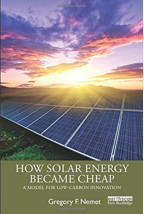 “How Solar Energy Became Cheap, by Gregory Nemet is exactly what the title suggests. The price of solar has plummeted in the last 20 years and this book tells the fascinating and long story going back to the 1950s. I relied heavily on this book for a recent blog post on the same topic.”
“How Solar Energy Became Cheap, by Gregory Nemet is exactly what the title suggests. The price of solar has plummeted in the last 20 years and this book tells the fascinating and long story going back to the 1950s. I relied heavily on this book for a recent blog post on the same topic.”
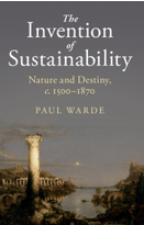 “The Invention of Sustainability: Nature and Destiny, c.1500–1870” by Paul Warde is actually on my To Read list rather than Have Read list but it seems a very good fit. It starts by correcting the error that there was ever a golden age of humans leaving in harmony with nature and then documents how the idea of sustainability emerged, initially in forestry management.
“The Invention of Sustainability: Nature and Destiny, c.1500–1870” by Paul Warde is actually on my To Read list rather than Have Read list but it seems a very good fit. It starts by correcting the error that there was ever a golden age of humans leaving in harmony with nature and then documents how the idea of sustainability emerged, initially in forestry management.
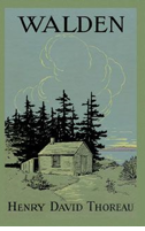 This year (during lockdown) I finally got around to reading “Walden” by Henry David Thoreau. I know it’s a seminal book for environmentalists. Thoreau chronicles his experiences living in the woods and it’s a classic of environmental consciousness.
This year (during lockdown) I finally got around to reading “Walden” by Henry David Thoreau. I know it’s a seminal book for environmentalists. Thoreau chronicles his experiences living in the woods and it’s a classic of environmental consciousness.
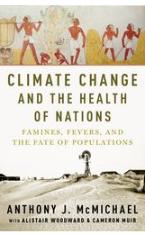 “Climate Change and the Health of Nations: Famines, Fevers, and the Fate of Populations” was published a few years ago but it was very timely to read this year, as COVID-19 ripped around the planet. The book is a chronology of the strong historical link between changing climates and outbreaks of disease and the (sometimes) complicated mechanisms that link the two.
“Climate Change and the Health of Nations: Famines, Fevers, and the Fate of Populations” was published a few years ago but it was very timely to read this year, as COVID-19 ripped around the planet. The book is a chronology of the strong historical link between changing climates and outbreaks of disease and the (sometimes) complicated mechanisms that link the two.
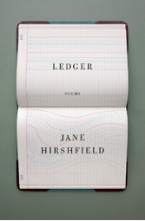 Lastly, something different, Jane Hirshfield’s recent collection “Ledger” has lots of poems on climate themes including this remarkable opener, Let Them Not Say
Lastly, something different, Jane Hirshfield’s recent collection “Ledger” has lots of poems on climate themes including this remarkable opener, Let Them Not Say
Dr Shane McDonagh, Energy Policy & Modelling Group, MaREI and the ERI.
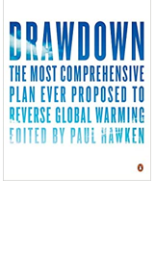
“It’s from 2017/18 but I particularly enjoyed Drawdown. High-level, covers loads from smart cities to smart farming, and biodiversity to bullet trains, little pros and cons piece for every idea. Great dinner party chat fodder (if you wreck your friend’s heads as much as me anyway).”
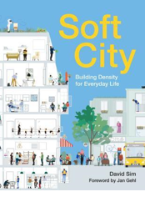 “Another one I really enjoyed was Soft City. It’s about increasing density in cities with a focus on how we can improve quality of life, sustainability, and alleviate the housing crisis.”
“Another one I really enjoyed was Soft City. It’s about increasing density in cities with a focus on how we can improve quality of life, sustainability, and alleviate the housing crisis.”
Dr Hannah Daly, Energy Policy & Modelling Group, MaREI and the ERI
 “Vaclav Smil’s Growth: From Microorganisms to Megacities shows how growth inevitably ends on a finite planet.”
“Vaclav Smil’s Growth: From Microorganisms to Megacities shows how growth inevitably ends on a finite planet.”
Dr Paul Deane, Energy Policy and Modelling Group, MaREI and the ERI
A few of Paul’s favourite books are shown below, but you can read his full list in his LinkedIn blog post.
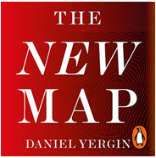 “The New Map: Energy, Climate, and the Clash of Nations by Daniel Yergin - this is a wonderful overview of the global energy landscape by the Pulitzer Prize-winning author of ‘The Prize’ and ‘The Quest’. Yergin shows how climate battles and energy revolutions are mapping our future.”
“The New Map: Energy, Climate, and the Clash of Nations by Daniel Yergin - this is a wonderful overview of the global energy landscape by the Pulitzer Prize-winning author of ‘The Prize’ and ‘The Quest’. Yergin shows how climate battles and energy revolutions are mapping our future.”
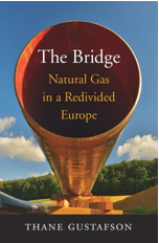 “The Bridge: Natural Gas in a Redivided Europe by Thane Gustafson. This is the story of the gas industry in Europe and how its relationship with Russia developed. Thane Gustafson is an expert on Russian oil and gas and this book provides deep insight on the mutual dependence of both regions on each other.”
“The Bridge: Natural Gas in a Redivided Europe by Thane Gustafson. This is the story of the gas industry in Europe and how its relationship with Russia developed. Thane Gustafson is an expert on Russian oil and gas and this book provides deep insight on the mutual dependence of both regions on each other.”
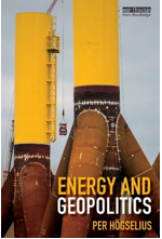 “Energy and Geopolitics Paperback by Per Högselius. Aimed a little more at students of energy, this book walks us through the complex world of energy supply and international energy relations, examining a wide spectrum of fossil fuels, alongside nuclear and renewables.”
“Energy and Geopolitics Paperback by Per Högselius. Aimed a little more at students of energy, this book walks us through the complex world of energy supply and international energy relations, examining a wide spectrum of fossil fuels, alongside nuclear and renewables.”
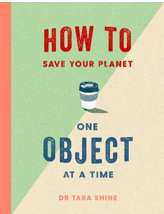 “How to Save Your Planet One Object at a Time by Tara Shine. I have learned so much from this book. I love it. It is easy and interesting to read and shows us practical things we can all do to reduce our environmental impact. Makes a great Christmas present too.”
“How to Save Your Planet One Object at a Time by Tara Shine. I have learned so much from this book. I love it. It is easy and interesting to read and shows us practical things we can all do to reduce our environmental impact. Makes a great Christmas present too.”
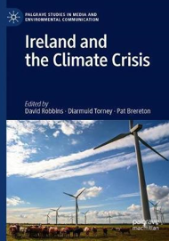 Finally, we have to recommend Ireland and the Climate Crisis, by Dr Dave Robbins,
Finally, we have to recommend Ireland and the Climate Crisis, by Dr Dave Robbins,
Dr Diarmuid Torney and Prof Pat Brereton. This book is not just an extremely comprehensive overview of Ireland’s response to the climate crisis, it also features a chapter written by our very own Dr Clare Watson (MaREI, ERI) on Community Engagement and Community Energy.